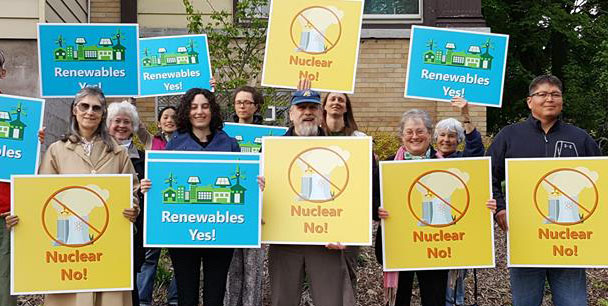 GreenWorld has covered the unfolding story of the American nuclear power industry’s clamor for new subsidies and bailouts since it started in 2014. Purely as a spectator sport, it might have been entertaining to watch the country’s largest utilities go from proclaiming a “Nuclear Renaissance” a decade ago to peddling the message that “Nuclear Matters.”
GreenWorld has covered the unfolding story of the American nuclear power industry’s clamor for new subsidies and bailouts since it started in 2014. Purely as a spectator sport, it might have been entertaining to watch the country’s largest utilities go from proclaiming a “Nuclear Renaissance” a decade ago to peddling the message that “Nuclear Matters.”
But there is just too much at stake to treat it like a game. The utility industry’s ramped-up efforts to block renewable energy and horde billions of our clean energy dollars to prop up old nukes risks both climate and nuclear disaster. Most of these proposals have been failing, thanks to the dogged persistence of grassroots activists and clean energy groups–and, it must be said, the outrageous sticker price of subsidies the industry needs. In fact, just this week, the two-year saga of FirstEnergy’s $8 billion nuclear-plus-coal bailout plan seems to have ended, with what amounts to a consolation gift to a couple FirstEnergy utility companies. Still an outrageous corporate giveaway, but no subsidies for nuclear or coal, even after it seemed like a done deal a few months ago.
But New York Governor Cuomo’s decision in August to award a 12-year, $7.6 billion subsidy package to four aging reactors–including reversing Entergy’s decision to close the FitzPatrick reactor this coming January–has put wind into the industry’s sails. Even that chapter isn’t over, with lawsuits already being filed and several more expected. And environmental groups this week launched a new campaign to get Governor Cuomo to smell the coffee and cancel what will not only be the largest corporate give-away in the state’s history, but relegate clean energy to second-class status behind old nukes.
The lingering uncertainty hasn’t stopped the industry PR and lobbying machines, though–after all, billions of dollars in free money is at stake! Exelon, FirstEnergy, and other companies touted New York as a national model, and began urging states from Connecticut to Illinois to follow suit. Having to get each state to line up is going to be a tall order. In addition to FirstEnergy’s failed Ohio bailout, Exelon hasn’t been able to sell a much smaller five-year, $1.5 billion subsidy in Illinois. And nukes in Connecticut and New Jersey are still making millions in profits each year, without heaping billions more in subsidies onto ratepayers’ utility bills.
So the industry has started pushing for a national bailout. NIRS thought we should take a look at what that might cost. Next week, we will publish a short report showing that a federal nuclear subsidy based on the EPA’s estimate of the social cost of carbon (as New York approved) would be massively expensive: up to $280 billion by 2030. Even if it were only applied to reactors that are already becoming unprofitable–more than half of the nukes in the country, according to a recent report–it would total at least $160 billion. In Illinois and Pennsylvania alone, it would cost ratepayers in each state $30 billion.
NIRS is launching a petition to the next President urging the new administration to say no to a national nuclear bailout, and to end subsidies for nuclear and fossil fuels. We hope you’ll sign the petition and help us get to our goal of 100,000 signatures. Whoever wins the election in November needs to know that another nuclear bailout isn’t going to fly with the American people.
There is no nuclear bridge to a clean energy future. If we are going to make good on the global climate treaty and prevent runaway global warming, we need to go all in on renewable energy (and efficiency!) and not waste our time and money propping up dirty energy sources. Nobody is even talking about putting the kind of money a national nuclear bailout would cost into climate action. But if we did, we could get off nuclear and fossil fuels in a generation. And maybe save the world.




Reblogged this on nuclear-news.
In your second paragraph you used the word “horde”. I’m pretty sure you meant “hoard”. You might want to correct that.
Definition of “horde”: http://www.dictionary.com/browse/horde?s=t
Definition of “hoard”: http://www.dictionary.com/browse/hoard?s=t
Huuwah!